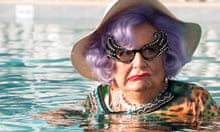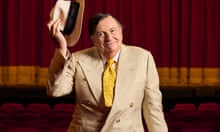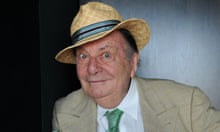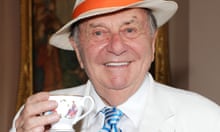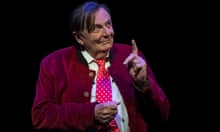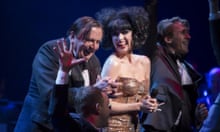When any well-loved entertainer dies, it’s sad. Now Barry Humphries has died, and maybe it’s more so – because we’re losing not only Humphries, but his alter egos too, characters more fleshed-out and better known to the public than Humphries himself. Dame Edna was among the most enduring personas comedy has ever seen, and undoubtedly one of the greatest. With her, and Sir Les Patterson, and with his contributions to Britain’s 60s satire boom, Humphries added to the gaiety of cultures (and subtracted from their dignity) across half a century and the span of the globe.
You don’t need to be Sigmund Freud to trace the source of Humphries’s outre comedy back to his repressive upbringing in 1930s Melbourne, and specifically his mother, who divided the world into things that were “nice” and things that were “uncalled for”. No one in mid-century Australia was calling for a mocking comedy that ridiculed suburban mores – and by association, narrow-minded, unsophisticated Australia itself. But that’s what Humphries gave them, first with “Mrs Norm Everage”, the surprisingly demure first incarnation of his greatest creation, then with his Barry McKenzie comic strip (and later, films) about a dimwit Aussie expat, which led to the book of the comic strip being banned in his home country.
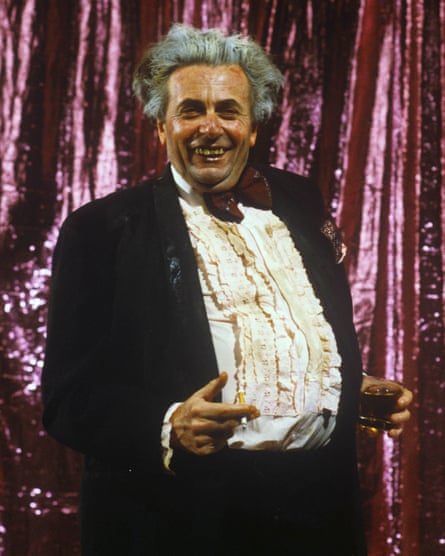
Humphries must have been tickled by that: getting a rise out of people was a compulsion. You could see his sad late-career brush with transphobia, which saw his name removed from the Melbourne comedy festival’s prestigious annual award, as consistent with that. But it wasn’t. It’s significant that Humphries’s remarks about trans men were made offstage, not on. I’m not saying his stage act was more polite, far from it. Many of his routines, such as the one that found the “transcendentally filthy” – Humphries’s own description – Sir Les Patterson chasing Kylie Minogue around the Royal Festival Hall with his (fake) penis out, might fall foul today of what Humphries took to calling “the new puritanism”.
But in his act, which was always meticulously prepared, he knew precisely how to calibrate offence and aggression. It was applied not with a bovver boot but with one of Dame Edna’s spindlier heels. It probably helped that Humphries was a scholar of provocation, having fallen hard for the dadaists as a young man. “Surprise and discomfort” were the qualities he admired in them, qualities that are present and gloriously incorrect in most of his work. Watch Dame Edna on other people’s chatshows and her own, where (a world away from the love-ins usually broadcast today) she put interviewers and subjects at anything but their ease. With lethal rudeness: “If you can’t laugh at yourself” – to Jeffrey Archer – “you might be missing the joke of the century.” Or with disarming incongruity. To Richard Gere and Lauren Bacall, on the Michael Aspel show to promote their new movies: “I must ask you about both of your films. What time will they be on?”
It’s a lovely line that, puncturing the promotional puff with a featherlight touch. For all that Humphries was an inveterate name-dropper, he was a subtle critic of the fame game, alert (in the critic John Lahr’s words) to “the aggression of the celebrity and the hypocrisy of their supposed decency”. The esteem in which Dame Edna respectively held herself, the “nobodies” in her audience, and her barely visible sidekick Madge taught us to be cautious about megastars’ pretensions to ordinariness. At least, it would have done, if we hadn’t been laughing so hard: Edna’s waspishness was a wonder, and Humphries’s quick wit seldom failed him. Or her. Clive James called his compatriot “an extremely sensitive man from a culture that didn’t value sensitivity”. But he turned sensitivity to his advantage, and you can see it at play in Dame Edna’s alertness to the moment and nose for very wrong remarks at just the right time.
Like many great comic acts, Humphries doesn’t easily fit into any tradition or movement. Edna wasn’t a drag act in any conventional sense. The joke isn’t about gender, about watching a man playing a woman. For the purposes of her act, Edna is a woman (“the woman you inhabit”, as the novelist Graham Greene described her to Humphries), for whom her audience delightedly suspends its disbelief. Humphries disliked the term “satirist”, too, and while there’s a strong strain of satire in Edna and Les’s shtick, there’s something more carnivalesque at play too. Something wilder, and more anarchic: Humphries cited Spike Milligan, another lord of misrule, as an influence.

Maybe the closest analogues are Alan Partridge, say, or Count Arthur Strong – other close-to-the-bone characters whose lives unfurl, across different media, in parallel with our own. Characters who began as grotesques and ended up the subject of the nation’s fondest affections. For many, Humphries’s legacy will be tainted by the PC-baiting provocations he favoured later in life, a function of his insistence that comedy is about saying what it would be impolite to say elsewhere. That diminishes but may not wholly extinguish the affection with which many will remember him, as a man (and a woman) dedicated to flouting propriety, to the gaudy instead of the grey, to saying and doing the uncalled for and to hell with the disapproval, parental or otherwise.

